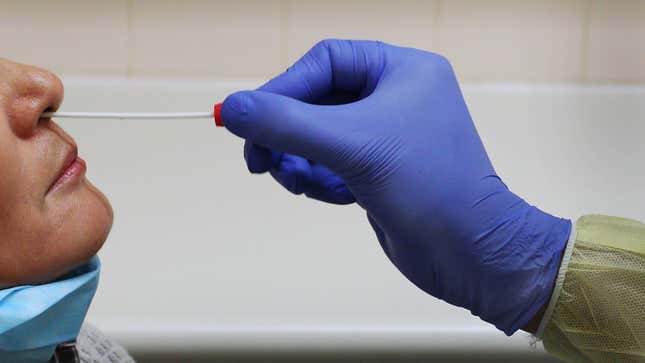
A Iowa woman’s nasal swab test for covid-19 caused her to leak spinal fluid, her doctors report, in what seems to be the first recorded injury of its kind related to the novel coronavirus. But don’t worry too much about something similar happening to you during a swab test—the unfortunate accident was likely only possible because the woman unknowingly had a rare congenital condition that left part of her skull open.
The case report was published Thursday in the scientific journal JAMA Otolaryngology–Head & Neck Surgery. According to the report, the woman had gone to her doctor with complaints of a runny nose, neck stiffness, headache, sensitivity to light, and a weird metallic taste in her mouth. A physical examination revealed some sort of mass in the right side of her nasal cavity, while tests of the woman’s snot showed that it contained spinal fluid.
When trying to piece together how she became sick, the woman told doctors that she had recently gotten a swab test for covid-19 as a precaution prior to her elective hernia surgery. Soon after, she began experiencing the runny nose and headache, as well as a bout of vomiting. Once she took an MRI, the problem was clearly identified. The woman, it turned out, had something known as an encephalocele: a sac-like formation of brain matter, membrane, and spinal fluid that protrudes out of an opening in the skull that shouldn’t be there.
An encephalocele (pronounced en-sef-a-lo-seal) is a rare birth defect, only thought to affect one in 10,000 newborns annually in the U.S. They happen when the neural tube—the precursor to the central nervous system in a fetus—doesn’t develop properly, causing some of the bones in our skull to not fuse as normal. They’re usually large enough to be easily noticeable on an ultrasound or once the baby is delivered. But sometimes, especially when the opening is around the nasal cavity, they’re small enough to go undetected, even for many decades, as happened to the Iowa woman, who is in her 40s. In this case, her encephalocele was actually spotted on a CT scan taken three years earlier in 2017, but doctors at the time only diagnosed her with a sinus infection.

While nasal swabs can certainly feel unpleasant (speaking from personal experience), the doctors in this case think it’s unlikely that the swab punctured her skull hard enough to cause a leak on its own. There have been reports of doctors injuring the nasal cavity to the point of causing spinal fluid to leak out, but it’s usually during a surgical procedure. So while this may be the first report of spinal fluid leakage linked to a swab test for covid-19, there are probably some hefty extenuating circumstances at play here.
“We therefore theorize that the swab itself did not result in a violation of the bony skull base, but rather the invasive test caused trauma to the patient’s pre-existing encephalocele,” the authors wrote.
As for the woman, doctors were able to successfully drain some of her encephalocele and to plug up the opening with a tissue graft.
Rare as this series of events may be, the authors do suggest that people with a known history of similar skull defects or previous sinus injury are tested for covid-19 in other ways than a nasal swab. There are now saliva tests available, with some evidence suggesting that they can be as accurate as the nasal swab. And health care workers can swab the back of the throat instead of deep inside the nasal cavity. But as of yet, these methods are still not as widely accessible or applied as the nasal swab test.